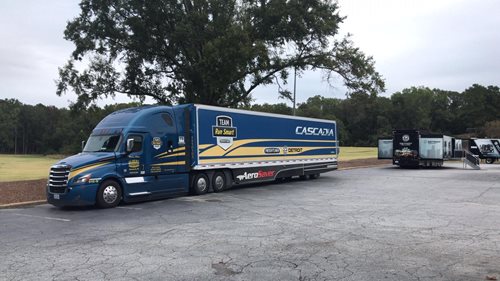
Last week my blog centered around the subject of making decisions. That blog was inspired by a driver who thought it was a good idea to take off the wheel covers his company installed on the truck to save fuel because he thought they looked stupid. There is a big difference between being an employee, an owner-operator, an independent owner-operator, and a fleet of any size. As a company driver, you will not make many decisions in regards to how the carrier is operated. Your job is to drive the truck, make the deliveries in the manner prescribed, and follow the rules and regulations set by states, federal and the carrier itself. You find many drivers who believe they could run the company better than the management team they work for. That is the beautiful thing about the country we live in because you are free to do that. Many businesses are started in that very manner. For many people going all the way into a business setting completely on their own is too much of a leap. Which is why most owner-operators are leased to operate under another company's authority. At this point, you are free to spec out your equipment any way you like. You are able to make choices whether to run wheel covers, an aerodynamic truck, a non-aerodynamic truck, a classic style truck, a fuel-efficient or performance-oriented power train. In most cases, you can even choose the color. All that matters is that your truck is capable and meets the requirements of the carrier you are leased on to.
Many people even at this point feel that they are not able to make enough of the decisions. Just because you own the truck does not make you your own boss. For example, I once knew of an owner-operator who was leased to a carrier, took it upon himself to help out a friend who's tractor had broken down over the weekend. He took his truck, hooked it up to this other person's low-boy trailer which was transporting an expensive piece of earthmoving equipment. And finished the delivery for his friend. Now mind you, this was a very nice gesture of one owner-operator helping out another owner-operator. And I applaud his generosity. However, there was at least one step missed in his charitable deed. The missing step was the carrier he was leased to was not contacted to inform or ask permission to move this trailer!
This driver actually told his carrier after this goodwill deed was finished and was surprised to find out how angry his carrier was for not being asked permission to do this “favor”. The owner-operator thought it should have been okay since it's his truck after all which is most of the way correct. What was not taken into consideration was his truck was leased to his carrier, which means if anything had happened during the process of delivering this load, the carrier would have been responsible. In the end, they too applauded his goodwill but informed him he needs to make them aware of the situation and ask for permission so that they can make sure the deed is concluded in a safe and legal manner.
If an individual wants to make bold moves as discussed in the previous paragraph, it would make a fine time to get their own operating authority. When operating completely on your own every decision is able to be made on your own. In fact, you can even operate illegally and not affect anyone but yourself when you get caught. The biggest mistake I see many make when they take this step of becoming independent on their own authority is that they are their own boss. Sure you're calling your own shots. You can work or not work whenever you choose. But remember, you can also go out of business rapidly with that attitude as well. I can honestly say after getting my own authority, it felt as though there were more bosses telling me what to do than ever before. It is my belief that if you do not treat each one of your customers like they are your boss, you will soon find that you do not have any customers. This is not much different than if you run a restaurant that served food that only you liked and expected people to come in and dine who did not like your taste. Remember, you are serving others with your business which means their satisfaction will lead to repeat business.
If you have really done well as an independent owner-operator, the next logical step is to become a small carrier. This can be done with leased on owner-operators, your own trucks with company drivers, your own customer base, or working the spot market. The important thing to know is your decision-making process is affecting many more people at this point. Now you are an employer who has to deal with personnel as well as satisfying customers. Now you are on the other side of the fence and will have employees who will think they know how to run your business better than yourself. Still, you have to maintain your customers with the same level of service they have come to expect from your brand. At this point, we have come completely full circle. Now that you are the employer or the carrier whom trucks are lease onto, how will you set up the framework? What speed will you allow the trucks to be operated at? How will you have your equipment spec'd? Will there be a dress code? Most people who make it to this point find that many of their earlier opinions as a company driver change when their name is the one on the line. I guess we just went through the trucking version of the “circle of life”.